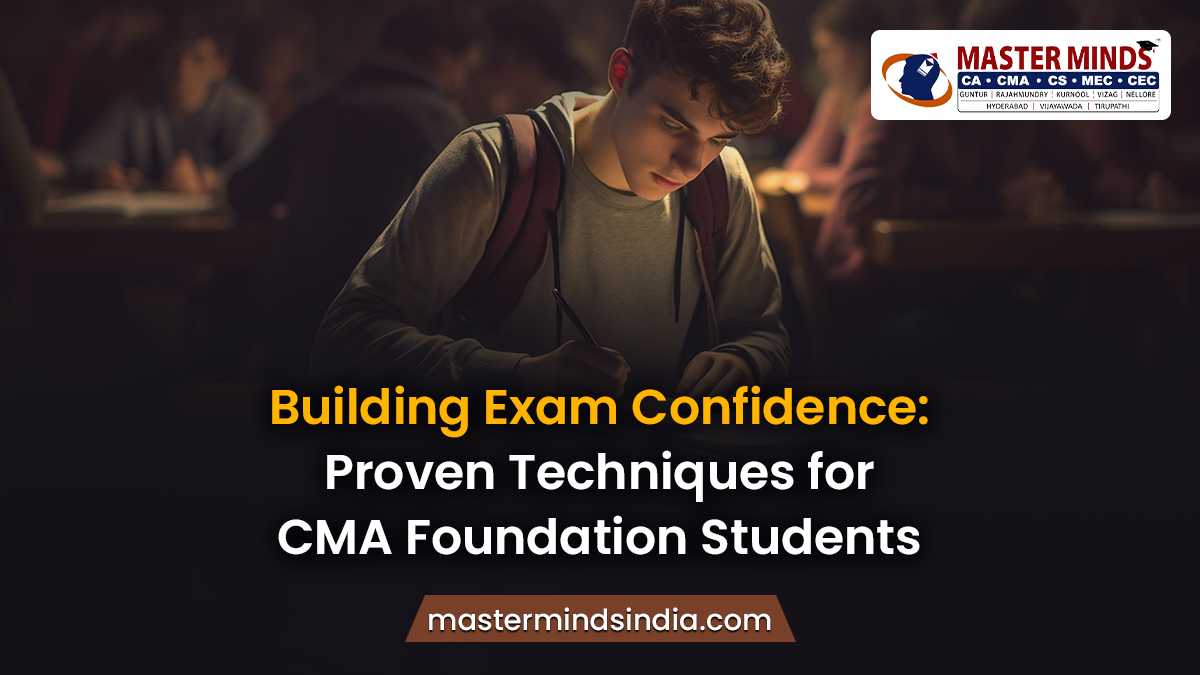Blog
How To Build Exam Confidence in CMA Foundation Students?

Dear readers, welcome to Mastermindsindia.com. In the competitive field of Cost and Management Accountancy, the CMA Foundation exam is your first important step. To succeed, you need both knowledge and confidence.
Confidence is a key part of your exam strategy. It affects how you study, manage your time, and perform under pressure.
So, how can you build this confidence? How can you turn pre-exam nerves into strong focus?
How To Build Exam Confidence in CMA Foundation Students?
In this blog, we’ll share proven techniques to help you face your CMA Foundation exams with confidence—techniques so effective that even beings from other worlds would take notice.
Understanding Your Strengths and Weaknesses
Confidence is deeply rooted in self-awareness. Begin your preparation by conducting a thorough self-assessment. Identify the areas where you excel and those where you struggle.
This isn’t just about knowing the syllabus—it’s about understanding your learning style, the types of questions you tend to miss, and the subjects that require more attention.
Regular Mock Tests
Simulate exam conditions by taking regular mock tests. These tests not only help you gauge your readiness but also desensitize you to the pressures of exam day. The more familiar you are with the exam format and timing, the less daunting the real thing will feel.
Analyze your performance after each mock test, focusing on both the mistakes made and the time management strategies that worked well.
Customizing Your Study Plan
Use the insights from your self-assessment to create a personalized study plan. Allocate more time to areas of weakness, but don’t neglect your strengths. A balanced approach ensures that you walk into the exam room feeling prepared across the board, which naturally boosts your confidence.
You Can Also Read:
- CA Intermediate New Study Material
- CA Course Duration After 10th, 12th & Graduation
- Tips to Crack CA in First Attempt
- Time-Saving Calculator Tricks for CA Foundation Students
- How to become a CA?
- CA Foundation New Syllabus
- CA Inter New Syllabus
- ICAI CA New Scheme
Mental Rehearsal
Visualization is a powerful psychological tool used by top performers across various fields, from athletes to business leaders. Close your eyes and visualize yourself in the exam room, confidently answering questions, managing your time efficiently, and emerging victorious at the end of the session. This mental rehearsal prepares your mind to handle the actual exam scenario with calm and poise.
Daily Affirmations
Positive affirmations can reshape your mindset over time. Start each day by affirming your capabilities and readiness. Statements like, “I am well-prepared, and I will excel in this exam,” or “I am confident and capable of handling any challenge that comes my way,” can have a profound impact on your self-confidence.
Overcoming Negative Thoughts
It’s natural to experience moments of doubt, but don’t let them derail your progress. When negative thoughts creep in, counter them with positive alternatives.
For example, replace “I’m going to fail this exam” with “I’ve studied hard, and I’m ready to do my best.” Over time, this practice trains your brain to focus on success rather than failure.
Mindfulness and Meditation
Anxiety often stems from a fear of the unknown or the pressure of high expectations. Incorporate mindfulness and meditation into your daily routine to manage stress.
These practices help you stay present, reduce overthinking, and maintain a calm state of mind, which is crucial in high-pressure situations like exams.
Breathing Techniques
Deep breathing exercises can instantly calm your nerves. Before you start your exam, take a few deep breaths to center yourself. Focus on inhaling slowly through your nose, holding your breath for a few seconds, and then exhaling through your mouth. This simple technique helps slow down your heart rate, clears your mind, and restores focus.
Practical Preparedness
One of the best antidotes to anxiety is preparation. Ensure that you have all your study materials organized, know the exam venue and timings, and have a clear plan for exam day. When you eliminate uncertainties, you reduce the scope for anxiety to take hold.
Timed Practice Sessions
Confidence comes from knowing that you can perform well under pressure. Regularly practice solving questions within the time limits you’ll face during the actual exam. This not only improves your speed and accuracy but also conditions your mind to stay focused and efficient, even as the clock ticks down.
Peer Group Studies
Studying in a group can provide a valuable mix of support and challenge. Discussing complex topics with peers, solving problems together, and even quizzing each other can reinforce your knowledge and boost your confidence. Additionally, explaining concepts to others is one of the best ways to solidify your understanding.
Handling Uncertainty
Not every question in the exam will be straightforward. Train yourself to remain calm in the face of uncertainty. Practice guessing intelligently when you’re unsure of an answer, and remember that it’s okay not to know everything. Confidence also means trusting your instincts and making the best decision with the information you have.
The Night Before
Avoid cramming the night before your exam. Instead, review key concepts, then focus on relaxation. Get a good night’s sleep to ensure that your mind is sharp and ready. A rested brain is far more effective than one that is fatigued and stressed.
Morning Rituals
Start your exam day with a positive and calming routine. Engage in light exercise, enjoy a nutritious breakfast, and do a quick mental review of your key points. Keep your environment positive—listen to uplifting music, or spend a few minutes in meditation.
Confidence Walk
As you enter the exam center, walk with purpose. Confidence often manifests in your body language. A strong, assured walk, coupled with a positive mindset, sets the tone for your performance. Remember, you’ve prepared for this moment, and now it’s time to show what you’re capable of.
CA & CMA Online Classes:

